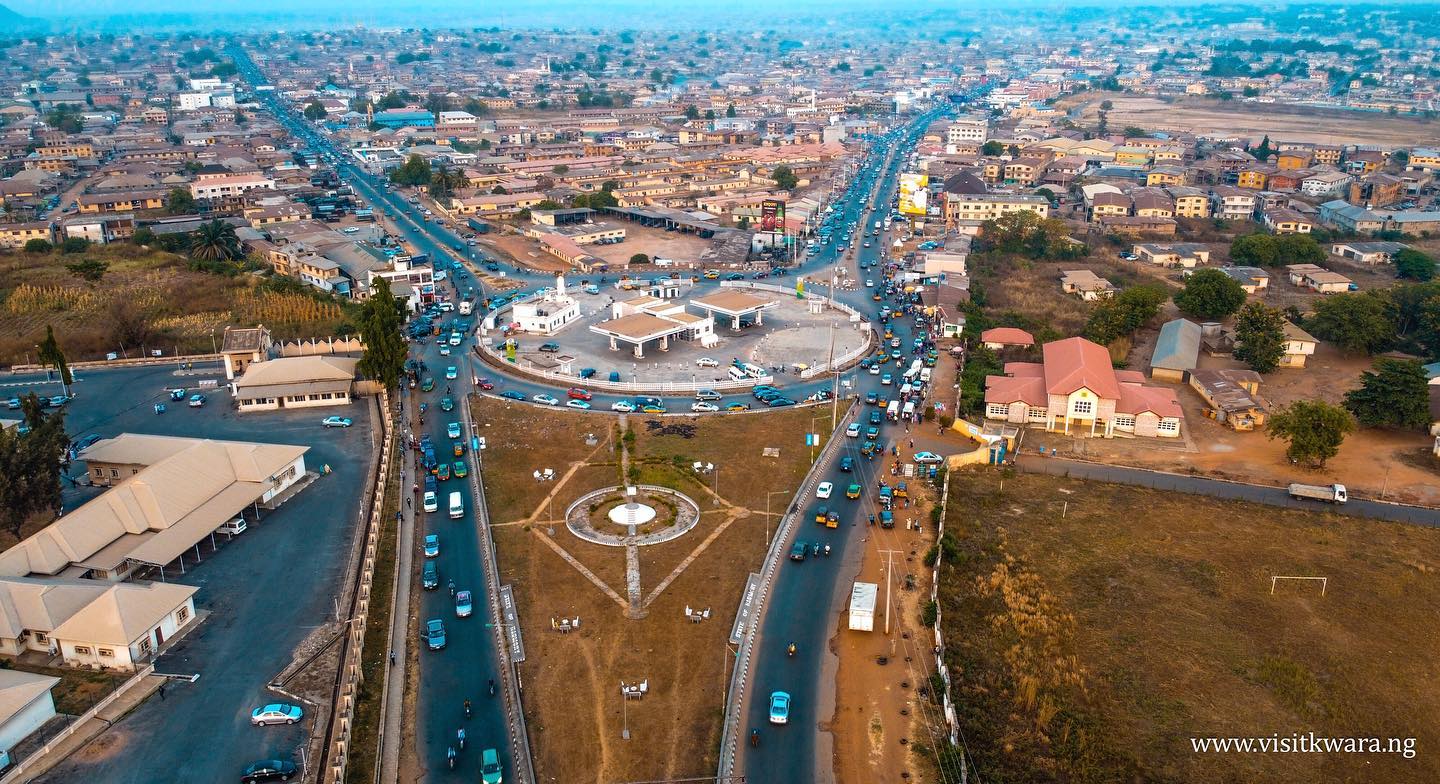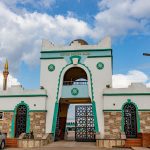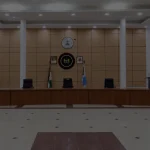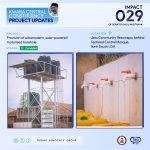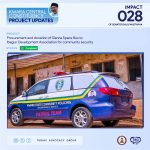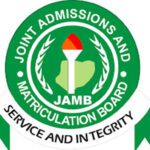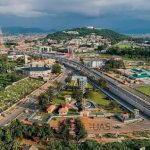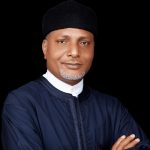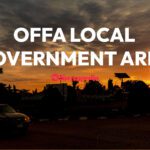« Quick Facts »
Slogan: State of Harmony
Date Created: 27 May 1967
Geopolitical Zone: North Central
Natives of Kwara: Kwarans
Capital: Ilorin
Number of LGAs: 16
Total Land Area: 36,825 square kilometers
Postal Code: 240001
Governor: AbdulRahman AbdulRazaq
Deputy Governor: Kayode Alabi
Kwara State, domiciled in the North Central geopolitical zone of Nigeria, is bordered by Kogi State to the east, Niger State to the north, and Ekiti, Osun, and Oyo states to the south. To the west, it shares part of the international border with the Republic of Benin. Because of its unique geographical position, the State is often referred to as the “gateway” between the northern and southern regions of the country.
The dominant tribes include the Yoruba, Nupe, Bariba, and Fulani, which make up 16 local government areas and have the city of Ilorin as the capital.
« History »
Kwara State was created on May 27, 1967, when the Federal Military Government of General Yakubu Gowon reorganized Nigeria from four regions into twelve states. Initially comprising the former Ilorin and Kabba provinces of the Northern Region, the state was first named West Central State but was later renamed “Kwara,” after the local Hausa name for the River Niger.
Since 1976, Kwara State has significantly reduced in size due to further state-creation exercises in Nigeria. On February 13, 1976, the Idah/Dekina part of the state was carved out and merged with a portion of the then Benue/Plateau State to form Benue State.
Subsequently, on August 27, 1991, five local government areas—Oyi, Yagba, Okene, Okehi, and Kogi—were excised to become part of the newly formed Kogi State, while Borgu Local Government Area was merged with Niger State.
« Local Government Areas »
« Map of Kwara »
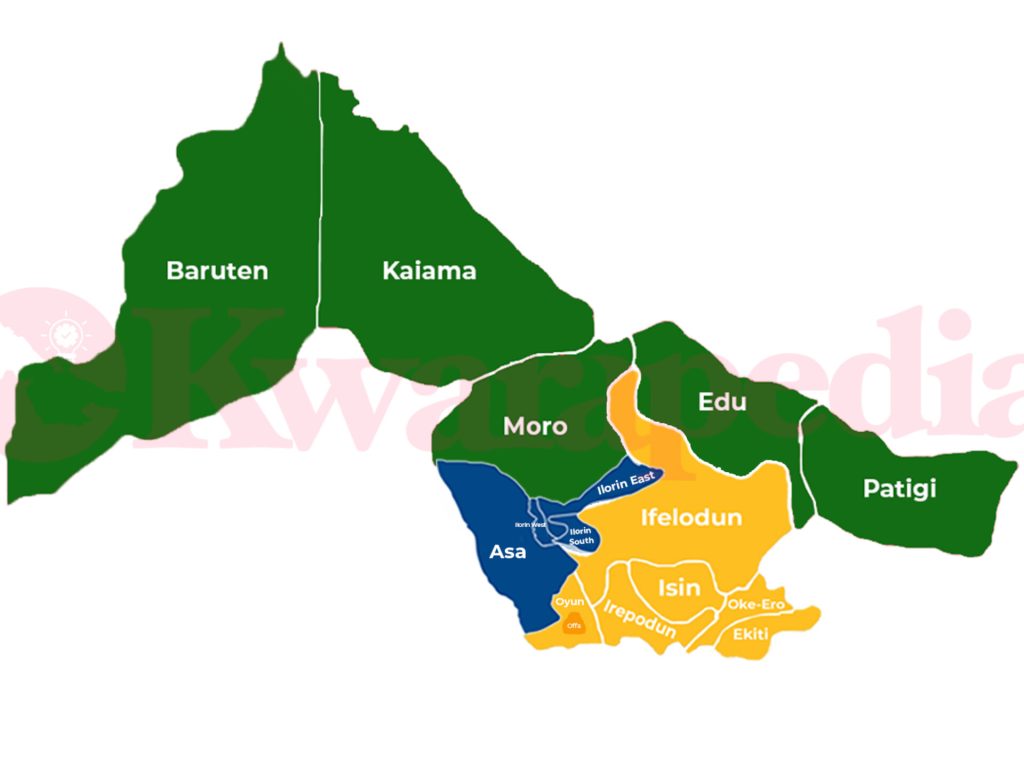
« Geography • Demographic • Population »
Kwara state has a total area of 36,852 km squared with an average annual precipitation of 2100 mm and an average temperature of 29 degrees centigrade. The state has two major seasons; the rainy and dry seasons with average humidity of about 47 percent.
Kwara state is one of the least densely populated regions in the country. It has a diverse population comprising various ethnic groups, including the Yoruba, Nupe, Bariba, Busa, Baatonun, and Fulani. The Yoruba people are the dominant ethnic group.
According to the 2006 census, Kwara State had a population of approximately 2.37 million people, but current estimates suggest that the population has grown significantly since then.
« Economy »
Agriculture and Commerce form the bulk of the economic engagements of the inhabitants of Kwara state. Crops cultivated in Kwara state include rice, maize, yam, cassava, sorghum, tobacco, kolanut while cotton weaving, pottery making, and the making of raffia mats are the traditional crafts.
The mineral deposits include limestone, quartz, feldspar, clay, gold, marble, granite, columbite, tantalite, cassiterite, microlite, wolframite, limonite, Dolomite, Talc, glass sand, gravel and kaolin.
The state has several industries which include a Tuyil Pharmaceutical, Kam Wire Holding and so on. Trade also flourishes in Kwara state with the state hosting several markets such as the Owode market Ilorin, Oja tuntun market Ilorin, Ilesha Baruba International Cattle market, Kara market, Ijomu-oro town market, and the Ipata market Ilorin.
Kwara State is rapidly emerging as a thriving hub for Micro, Small, and Medium Enterprises (MSMEs) in Nigeria. This growth is driven by strategic government policies, an enabling business environment, and substantial investments in infrastructure. The state’s unique geographical position, serving as a gateway between the northern and southern regions of the country, enhances its accessibility and market reach.
« Culture • Tourism »
Kwara State boasts a rich cultural heritage, with various traditional festivals, dances, and music. The state is known for its vibrant cultural expressions, including the Durbar festival, which is a colorful display of horsemanship and traditional regalia; the traditional wrestling competition Ijakadi festival; and the Awon Mass Wedding in Shao.
Tourist attractions in Kwara include the Esie Museum, famous for its ancient stone carvings; Owu Waterfalls, one of the highest and most spectacular waterfalls in West Africa; and the Sobi Hill, the largest landform in Ilorin. There is also Imoleboja Rock Shelter, Ogunjokoro, Agbonna Hill, and Ero Omola Waterfall another notable tourist destination in the region.
« Education »
Kwara State is home to several notable educational institutions, fostering a strong academic environment in Nigeria including the University of Ilorin (UNILORIN), which is one of Nigeria’s premier federal universities and known for its high academic standards.
Other notable institutions include Kwara State University (KWASU), Al-Hikmah University, Kwara State Polytechnic (KWARAPOLY), Federal Polytechnic Offa (FEDPOFFA), Kwara State College of Education (KWACOED). These institutions collectively contribute to the state’s reputation as a hub of learning and intellectual growth.
« Governance »
The state operates under a democratic system with an executive governor and a legislative assembly. Kwara has 16 local government areas (LGAs), each administered by a local government council. The state government focuses on improving infrastructure, healthcare, education, and economic development.
Kwara State has been governed by a diverse array of leaders since its creation. Here is a comprehensive list of the governors who have shaped the state’s political landscape over the years.
| Governor | Tenure | Title | ||
|---|---|---|---|---|
| David Bamigboye | – | 1967-1975 | – | Military Governor |
| Ibrahim Taiwo | – | 1975- 1976 | – | Military Governor |
| George Agbazika Innih | – | 1976-1978 | – | Military Governor |
| Sunday Ifere | – | 1978- 1979 | – | Military Governor |
| Adamu Atta | – | 1979- 1983 | – | Civilian Governor |
| Cornelius Adebayo | – | October 1983 – December 1983 | – | Civilian Governor |
| Salaudeen Latinwo | – | 1984-1985 | – | Military Governor |
| Mohammed Umaru | – | 1985-1987 | – | Military Governor |
| Ahmed Abdullahi | – | 1987- 1988 | – | Military Governor |
| Ibrahim Alkali | – | 1988-1989 | – | Military Governor |
| Alwali Kazir | – | 1989-1992 | – | Military Governor |
| Shaaba Lafiagi | – | 1992- 1993 | – | Civilian Governor |
| Mustapha Ismail | – | 1993-1994 | – | Military Governor |
| Baba Adamu Iyam | – | 1994- 1996 | – | Military Governor |
| Peter Ogah | – | 1996-1998 | – | Military Governor |
| Rasheed Shekoni | – | 1998-1999 | – | Military Governor |
| Mohammed Lawal | – | 1999-2003 | – | Civilian Governor |
| Bukola Saraki | – | 2003-2011 | – | Civilian Governor |
| Abdulfatah Ahmed | – | 2011-2019 | – | Civilian Governor |
| AbdulRahman AbdulRazaq | – | 2019 till date | – | Civilian Governor |


